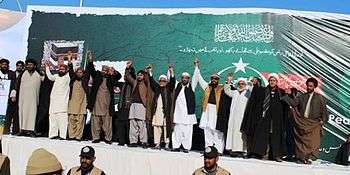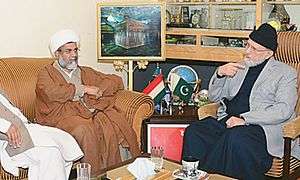Majlis Wahdat-e-Muslimeen
Majlis Wahdat-e-Muslimeen مجلس وحدت مسلمین | |
|---|---|
|
| |
| Secretary General | Allama Raja Nasir Abbas |
| Deputy Secretary General | Allama Amin Shaheedi |
| Political Secretary | Syed Nasir Abbas |
| Central Spokesman | Allama Syed Hassan Zafar Naqvi |
| Founded | August 2, 2009 |
| Headquarters | Islamabad, Pakistan |
| Newspaper | Roznama Wahdat |
| Working Wings |
Wahdat Youth Wing Wahdat Women Wing Khair ul Amal Foundation |
| Ideology | Working for Unity of Ummah & Helping Oppressed People of Pakistan |
| Colors |
Black, Red and green |
| Senate |
0 / 104 |
| National Assembly |
0 / 342 |
| Balochistan Assembly |
1 / 65 |
| Gilgit-Baltistan Assembly |
2 / 33 |
| Election symbol | |
 | |
| Website | |
| www.mwmpak.org | |
 |
| This article is part of a series on the politics and government of Pakistan |
| Constitution |
|
Majlis Wahdat-e-Muslimeen Pakistan (MWM) (Urdu: مجلس وحدت مسلمین) is a Shiite Political organization in Pakistan participating in political activities in all over country with headquarter in Islamabad. MWM Pakistan working with ideology to establish an Islamic democratic welfare state, particularly emphasizing on Shiite-Sunni unity in the country.
History
The Majlis Wahdat-e-Muslimeen was founded by a group of Shiite Muslim clergy and former members of single largest Shiite students' organization Imamia Students Organization on August 2, 2009 in Islamabad, Pakistan. It has a prominent presence among the Shiite Muslims in the Punjab, Sindh, Khyber Pukhtunkhwa, Baluchistan, Gilgit-Baltistan and in Azad Kashmir. The party's main perspective is to raise the voice against oppression on Pakistan's Shia community, establish goodwill with the Sunni Muslim community, raise the political and religious awareness among the Shia Muslims of Pakistan and to revive the teachings of the Holy Koran and Prophet Muhammad in the society.
Elections
In an interview with The Express Tribune, the Majlis Wahdat-e-Muslimeen Karachi's political secretary, Syed Asghar Abbas Zaidi, said that the party’s aims were not only to gain seats but to change the system to the Islamic one.[1] The Election Commission of Pakistan designated the Majlis Wahdat-e-Muslimeen as a political organization in the early 2013. The election commission also allotted Majlis Wahdat-e-Muslimeen the tent as an electoral symbol. The Majlis Wahdat-e-Muslimeen announced in March 2013 that in the 2013 general elections, it would field more than 50 candidates on provincial seats and 20 on national seats, of which Karachi-based candidates accounted for 10 provincial slots and 11 national seats.[2]
Ties and Muslim unity

Majlis Wahdat-e-Muslimeen not only supported Pakistan Tehreek-e-Insaf in the general elections but is also the first religio-political organization which was supported by Imran Khan and his party.[3]
Sunni Tehreek, Minhaj-ul-Quran International, Sunni Ittehad Council and Jamiat Ulema-e-Pakistan (despite being Sunni religio-political organizations) are the moral supporters of Majlis Wahdat-e-Muslimeen (Shiite religio-political organization) and all of them are on one platform against Pakistani Taliban and its sub-groups such as Sipah-e-Sahaba and Lashkar-e-Jhangvi.[4]

Majlis Wahdat-e-Muslimeen and Sunni Ittehad Council held many huge gatherings in different cities of Pakistan to promote unity. Figures of minorities including Christians and Hindus were invited in these gatherings as well. The Majlis Wahdat-e-Muslimeen says that they believe that unity is the only way out from sectarian tensions among the Muslims created by the enemies. They held gatherings in Kairpur, Islamabad, Gilgit, Karachi and many more places. [5]
PAT President Dr Raheeq Abbasi has said that we express our gratitude to the leadership of Majlis-e-Wahat-ul-Muslameen (MWM) for its unstinted support to Dr Tahir-ul-Qadri’s struggle for revolution. He said that we fully welcomed sagacious, wise, far-sighted and courageous decision of MWM head Allama Raja Nasir Abbas. He said that this support of MWM would continue through the decisive phase of revolution, adding that MWM would play an effective role in the struggle of changing the destiny of 180 million people of Pakistan. He said that MWM leadership’s decision to support revolution was for the sake of progress, stability and solidarity of the country.[6]
Terrorist attacks on leaders, candidates & workers
On April 28, 2013, Hassan Kashmiri, a resident of Rizvia Society and an activist for the MWM was gunned down by the unidentified armed men. Following his funeral prayers in the same locality, the mourning procession took his body to the Wadi-e-Hussain graveyard to be buried. According to the Senior Superintendent of the Police, Imran Shoukat, as the procession was passing through the Liaquatabad area, some of the participants opened fired, killing two other people. The MWM condemned the attack on Kashmiri and denied that the participants of the procession had opened fire. However, the banned Sipah-e-Sahaba is blamed for the attack.
While police were busy with Kashmiri's case, an attack on a Shiite scholar near Liaquatabad No.10 left him injured and the police constable deployed for his security dead. The Senior Superintendent of the Police, Amir Farooqi said that Syed Baqar Hussain Zaidi was heading towards Rizvia Society where he resided along with 32-year-old Police Constable Syed Muhammed Qasim Jafri when four men on motorcycles opened fire on the car they were travelling in.[7]
On 22 August 2014 Mazhar Haider and his younger brother Irfan Haider sustained bullet wounds. They were rushed to a private hospital where doctors pronounced the death of Irfan and admitted Mazhar with critical bullet wounds. MWM spokesman said Mazhar was the MWM president of district central. It was a targeted attack conducted by Sipah-e-Sahaba.[8]
Protest against target killing
In addition to hunger strike by MWM chief commenced in May 2016, camped in front of National Press Club Islamabad,[9] it organized protests through banners, placards and demonstration led by religious leaders at almost all big cities of Pakistan at different places on Friday 22 July-2016. MWM also staged a sit-in at Numaish Chowrangi, Karachi[10] and on The Mall outside the Punjab Assembly on same day.[11]
See also
References
- ↑ "Vote(s) of confidence: MWM banks on Shia voters across Sindh to sweep upcoming general elections". Express Tribune. April 20, 2013.
- ↑ "MWM declares 3-point agenda for seat adjustment". The Nation. March 31, 2013.
- ↑ "PTI and Majlis-e-Wahdat-ul-Muslimeen decide to jointly promote unity, peace and harmony". PTI official. November 20, 2013.
- ↑ "Pakistan's Top Shiite Party (MWM) Rejects Talk with Taliban". Ahlul Bayt News Agency. February 3, 2014.
- ↑ "Sunni Ittehad Council, MWM's Qaumi aman convention in Islamabad". Abb Takk News. Archived from the original on February 21, 2014.
- ↑ "PAT thanks Majlis-e-Wahat-ul-Muslameen for supporting revolution". Pakistan Awami Tehreek official.
- ↑ "Surge of violence: 11 killed in separate incidents in Karachi". Express Tribune. April 28, 2013.
- ↑ "An activist of Shiite political party shot martyred in Karachi". Ahlul Bayt News Agency. August 23, 2014.
- ↑ "Hunger strike of MWM leader enters second month". The Shia Post. June 19, 2016.
- ↑ "Karachi traffic in chaos as MWM extends sit-ins to other areas". Samaa TV. July 22, 2016.
- ↑ "MWM stages sit-in". Dawn News. July 23, 2016.